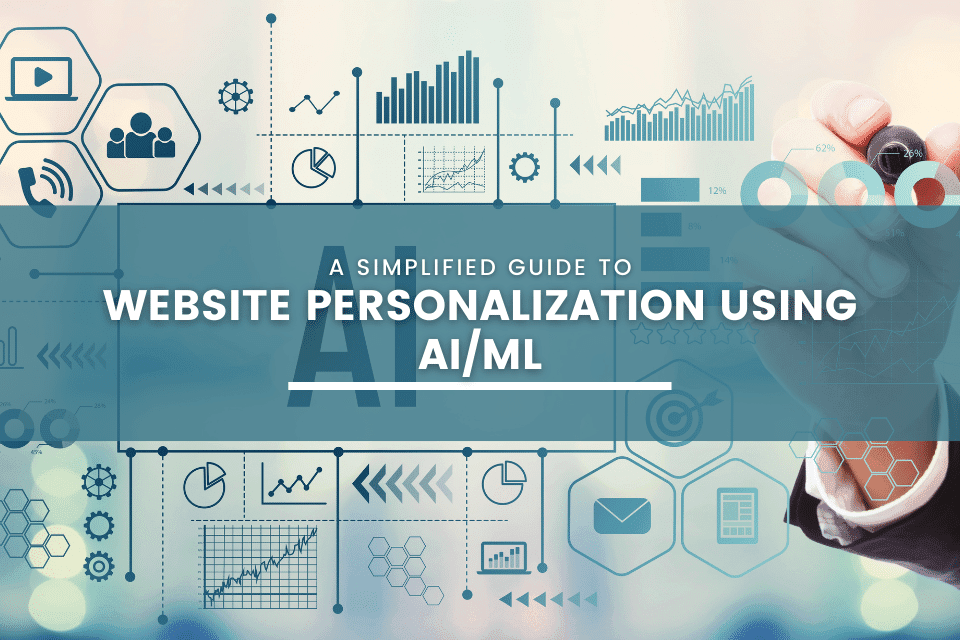This website uses cookies so that we can provide you with the best user experience possible. Cookie information is stored in your browser and performs functions such as recognising you when you return to our website and helping our team to understand which sections of the website you find most interesting and useful.
24 Dec

7 Step Guide To Give Your Customer A Personalized Website Experience
Artificial Intelligence and Machine Learning are two related fields that are taking the entire world by storm! Today, AI/ML is changing the way eCommerce stores operate, and create experiences for their customers. Starting from offering targeted product recommendations to providing virtual shopping assistance, AI/ML is transforming the way we know personalized shopping online.
Many marketers are already aware that AI can simplify their lives, with 88% of them stating that AI personalization will enable them to be more effective in getting to their goals. Furthermore, when spoken from the customers’ perspective, 66% of them expect companies to understand their unique needs, and personalize their online experiences.
So, how does AI/ML benefit business owners & marketers?
AI and ML involve gaining insights from large quantities of data to predict what customers want, when they want it and their preferred method of communication. This enables eCommerce owners & marketers to:
- Deliver the right product to the right person at the right time
- Handle and simplify enormously large sets of data, that too in as close to a real-time fashion as possible
- Target customers through extremely advanced and multiple segmentations simultaneously – most of which is beyond human capability and imagination
- Automate decision-making to a large extent, with no scope of error due to subjectivity or human judgement
Tip: As a business starting off with personalization, you require to first begin small by investing mostly in data collection and basic personalization tools. However, to accomplish personalization at a higher level, you need to move beyond manual approaches. In such cases, the use of AI/ ML drastically helps with personalization efforts. You should ideally think about moving to AI/ML driven personalization as and when: i) the volume of operations increases, ii) the business and target audiences expand, iii) you want a more accurate & scalable way to get unique experiences for users.
What are the use-cases of AI/ML in personalization?
Now that you know how useful AI/ML is as a personalization tool, let’s look at some use-cases where these technologies can be deployed on your eCommerce store:
1) Hyper-personalized product recommendations
- Get complex segmentations: Machine Learning can help you move on from traditional rule-based recommendation systems, to smarter and more intelligent algorithms. The result is much more advanced and complex segmentations. The algorithms could create all sorts of segments, such as time since the user last opened your app, or moments in the day when specific users buy the most, or number of returns made by the user in the last year, and so much more – the possibilities are beyond human imagination!
- Identify & predict patterns: A well-trained machine learning model is capable of finding hidden trends and patterns in datasets that human analysts and marketers can easily miss. These hidden patterns come in extremely handy when trying to suggest better product recommendations, with little to no human intervention in the process – basically like an automated shop assistant.
For instance, assume a customer is searching for pregnancy care items on any eCommerce website. If that platform is backed by sophisticated AI/ML models, it can help in predicting through their onsite behavior what stage of pregnancy the customer is currently in. Such algorithms also have the ability to subsequently display related product recommendations for different stages of the customer’s pregnancy.
- Understand human intent: Sometimes it may happen that a particular product might be out of stock at the moment. In such situations, the users should not be leaving the platform without any purchase. This is where smart recommendation systems, powered by AI/ML, come into the picture. Such hyper personalized recommender systems suggest alternative options, based on similar intent products or by predicting user intent based on their search history. You can also combine this with a simple “notify me” feature whenever the product appears back in stock.
2) Personalized Content
AI models are excellent for extracting deep insights from heaps of datasets – all in real-time. Using AI/ML models, marketers can predict the engagement of different types of users based on different conditions and content. From these predictions, the models can automatically generate different types of content. Usually, these predictions are based on a host of factors, such as:
- website interactions,
- products looking for
- content viewed,
- time spent on a specific content piece/ product page
- most viewed current content, and
- behavior of similar visitors.
For example: Let’s say that a user was looking for party dresses in their previous visit to your eCommerce store. Through the use of advanced AI models, it can be predicted what type of party the visitor could be going to, whether the user is a guest or the host themselves, what other kind of dresses would be most suitable for them, etc. Such complex predictions can only be made possible using AI-fueled engines. Advanced AI also enables you to change static content on your website, such as hero banners, CTA buttons, page layout, grids & menus according to each visitor’s preferences.
3) Personalized Messaging
ML enables quick segmentation and categorization of users, which speeds up the entire process of grouping customers and analyzing them as datasets. You can then send custom messages to each of these segments, depending on their needs and preferences.
Machine Learning can also help you optimize the timing of sending these personalized messages. For example,
- You can trigger the sending of a newsletter in those moments when your users check their inboxes or phones most often, for enhanced engagement.
- Using geolocation services, you can trigger offers and alerts whenever a registered customer visits your offline shop.
- You can also trigger personalized emails and push notifications to reach customers at the most critical moments or key events. This also gives you the room to close the conversion loop by sending emails automatically when visitors have stopped browsing, abandoned their carts, or there has been a product catalog change.
4) Personalized Ad Targeting & Retargeting
Machine Learning is empowering companies to produce more targeted ads based on a number of factors, all in real-time. These factors include purchasing history, demographics, website engagement, and other behavior that can help target and re-target the ads to the appropriate audience at the right time, at scale.
Moreover, AI/ML can help you decide the best ad copy to be delivered to a segment of users, the specific products that you should be advertising to them, the kind of personalized promotions you should be offering within each of these, and the price ranges they should be in. Predicting and analyzing all of these details accurately for multiple segments in real-time is not an easy feat, and certainly not when being done manually!
5) Personalized Marketing Offers
AI/ML can be used to generate individualized best offers for visitors and customers, based on their previous purchases and choices. For example, continuing the example of the pregnant customer, the eCommerce platform can send her timed coupons directly to her inbox by predicting the stage of her pregnancy, or they can highlight these coupon codes on the shopping cart page for specific products when she shops next.
AI/ML also helps you select the most effective target group of customers for a new promotion or offer – especially when you lack any predefined user segments. Furthermore, the best AI systems actually get better as more data comes into the system. So, as people consume more content, the data gets refined, which enables the AI system to become smarter over time, and offer a much more personalized shopping experience.
6) Dynamic Websites
Websites that use machine learning are able to change their content dynamically, depending on which visitor is on the website. They are able to do this in a seamless manner by taking into account a number of data points – like purchasing data, past behavior, geo-location, and more. For instance, many eCommerce platforms know where a user is located. Using this information, they are able to automatically translate the entire website into the common language of that location. These modifications can also be made to the currency and time zones mentioned on the website for a holistic personalized experience.
Additionally, you can also decide to show different website copies for new visitors vs returning visitors. For a first time user, you might want to provide more information about the products and offers; while in the case of repeat visitors, you might instead provide images to products they have previously purchased. Machine learning makes it possible for you to identify numerous such segments and serve dynamic website copies for all of them with ease!
7) AI-Powered Chatbots/ Conversational Commerce
While browsing your eCommerce store, customers might have a lot of questions. These questions can be around your products, offers, services, or anything at all, and may not just be limited to the specified fields you are showing on your website. In such situations, personalized AI chatbots come in extremely handy in not only helping the users in real-time, but also extracting deeper insights from them using the method of conversation. In fact, it is predicted that the future of search is assistive: a search engine or avatar will guide you through the search process, rather than leaving you alone with a search bar and a whole internet’s worth of results. Keeping that in mind, it is a good idea to invest in AI-powered chatbots for your eCommerce website!
8) Better Customer Sentiment Analysis
AI can help in identifying the true emotions and sentiments of users, rather than generalizing between two different customer interactions. Such systems are capable of learning individual users’ quirks, which gives them the power of providing much more detailed sentiment analysis. For instance, customer feedback on your social media page will carry words with positive or negative connotations. Using sentiment analysis, your machine learning system can detect these words and phrases and get an accurate picture of how your customers are feeling.
Another way of understanding your users is through product ratings and reviews. For example, browsing through multiple products from the same category on an eCommerce website and then picking one can be considered as an implicit positive rating of a chosen offer. Similarly, if a regular customer suddenly becomes inactive after receiving a particular product from you, it is an indicator that they may have not liked something about the product. These are very subtle indications that become extremely complex on a large scale. In such cases, AI/ML systems prove to be of extreme value.
All in all, AI/ML-driven personalization is coming: it’s demanded by consumers, preferred by marketers, and enabled by technology. From a business perspective, it will enable marketers to engage more effectively to improve business metrics. And from the customer’s view, it will enable businesses to engage more meaningfully, and provide better online shopping experiences.
Related Post
Industries Served
United States
India













